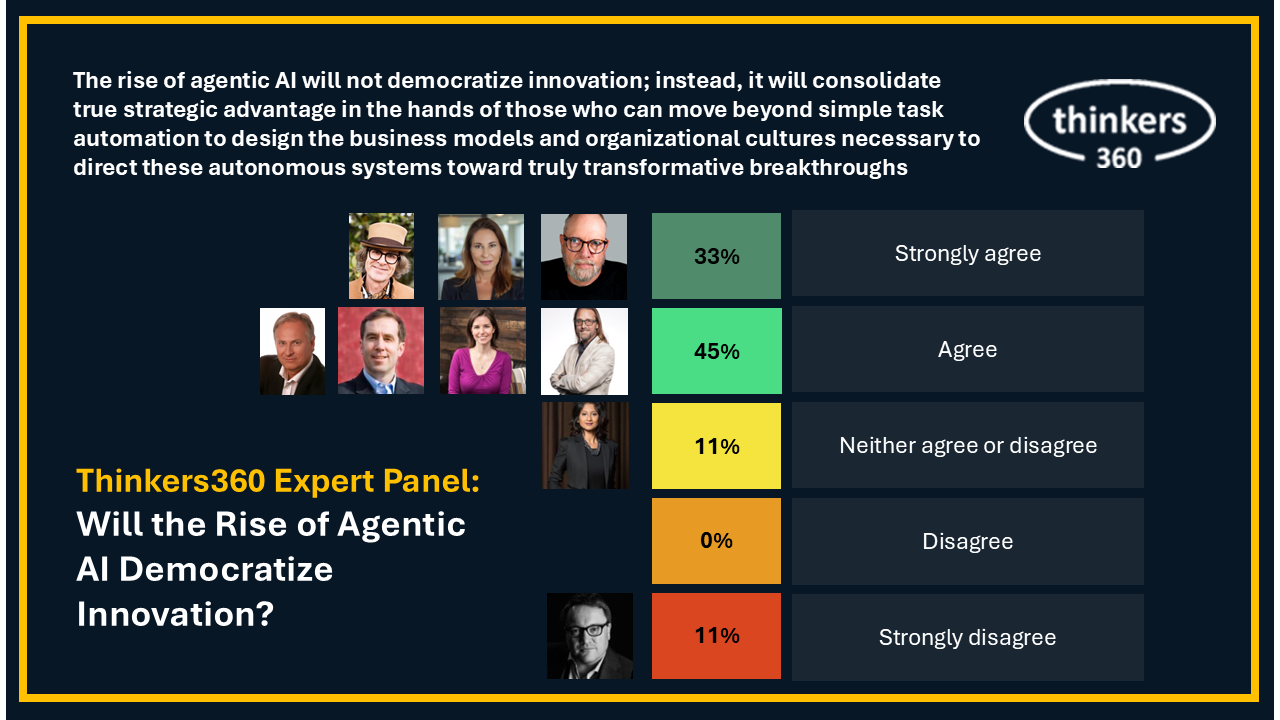Thinkers360 Expert Panel: Will the Rise of Agentic AI Democratize Innovation?
Ready to Elevate Your Authority?
You’ve seen the quality of expertise shared in this panel. Whether you’re an individual thought leader looking to showcase your content, or a brand/startup seeking top-tier experts for your next campaign, Thinkers360 is where influence happens. Join the world’s premier B2B thought leadership community today to connect, collaborate, and grow.
➡️ Join Thinkers360 Now & Get Started
Welcome to a new series from Thinkers360! We’re excited to present a fresh format for our Expert Panel discussions, offering a deep dive into the most pressing topics in technology and business. Rather than a traditional Q&A, we’ve curated a panel of our top thought leaders, including Thinkers360 Ambassadors, to respond to a single, provocative statement. This approach allows us to capture a wide spectrum of perspectives, from concise declarations to nuanced, detailed arguments.
For our next panel, we asked a crucial question facing our society: “The rise of agentic AI will not democratize innovation; instead, it will consolidate true strategic advantage in the hands of those who can move beyond simple task automation to design the business models and organizational cultures necessary to direct these autonomous systems toward truly transformative breakthroughs.”
Panelists were asked to select one of five options: Strongly Agree, Agree, Neither Agree or Disagree, Disagree, or Strongly Disagree.

Thinkers360 – Expert Panel – Will the Rise of Agentic AI Democratize Innovation?
The expert panel was presented with the statement that agentic AI will not democratize innovation but will instead consolidate strategic advantage for those who design the necessary business models and organizational cultures. An overwhelming majority of the nine panelists supported this view, with five panelists Agreeing and three Strongly Agreeing. Gijs van Wulfen and Michael Fauscette, both of whom Strongly Agreed, articulated the core argument: the real barrier isn’t technology access but organizational sophistication and the discipline to combine human-centered innovation with AI autonomy. Fauscette likened the situation to owning Excel—technology access doesn’t automatically confer strategic advantage.
The other panelists who Agreed—Pascal Bornet, Kathleen Walch, Braden Kelley, and Truls Berg—focused on the need for fundamental, organization-wide change. Bornet argued that sustainable advantage requires cultivating “Three Competencies of the Future” (Change-Ready, AI-Ready, and Human-Ready) to leverage uniquely human capabilities alongside AI. Walch and Kelley emphasized the “herculean effort” required to redesign work, leadership, and governance, noting that without intentional strategies like change management, agentic systems will be underutilized. Berg echoed this, comparing agentic AI to the electric guitar: the greatest value accrues to those with the vision and courage to “reinvent what’s possible with it,” not just those who use it for efficiency.
The remaining panelists offered a more nuanced or dissenting perspective. Rene Clayton Strongly Agreed that agentic AI will consolidate strategic advantage but argued it is also simultaneously democratizing innovation by lowering the barrier for small, agile firms who adopt AI-first workflows. Kamales Lardi chose Neither Agree Nor Disagree, believing that while autonomous systems have the potential to democratize innovation, the actual competitive advantage will hinge on embedding the AI with strong organizational design and ethical frameworks to ensure accountability and safety. The single voice of dissent, Michael Gale, Strongly Disagreed, citing data that suggests “sovereign AI” is already proving its ability to democratize power and unleash human potential across the enterprise, as evidenced by top-performing organizations running double the volume of use cases across all business functions.
Read on to explore our expert panelists’ opinions in depth and join us on Thinkers360.com to be part of the conversation.
The rise of agentic AI will not democratize innovation; instead, it will consolidate true strategic advantage in the hands of those who can move beyond simple task automation to design the business models and organizational cultures necessary to direct these autonomous systems toward truly transformative breakthroughs.
Agree
Strongly Agree
“I strongly agree with this statement. AI is not a gimmick, but can be a driver of bold new directions.
Simply automating what we already do will never create real breakthroughs. Innovation requires vision, courage, and discipline to put the right systems in place. Agentic AI will only multiply that effort if the organisation knows how to harness it.
So yes, it will reward the pioneers who can combine human centered innovation with AI autonomy in a structured way. They will create new markets, reinvent industries, and leave the rest behind.
The challenge for innovation leaders is clear: stop seeing AI as just efficiency and start building the conditions for transformative innovation. That is where the strategic advantage lies.” – Gijs van Wulfen, Keynote Speaker, FORTH Innovation Institute
Strongly Agree
“I strongly agree that Agentic AI will consolidate strategic advantage, but not because it centralizes power by default. The real shift is that it is rewriting the rules of innovation. I am also a strong advocate for ethical and responsible AI.
From my experience, the most exciting change is how Agentic AI democratizes innovation. The era where only large companies with lots of cash and tech teams lead transformation is ending. Now, small businesses (like mine) and agile teams drive significant impact by leveraging AI-first workflows, real-time data, and autonomous systems to boost productivity and unlock new growth. This trend is fueling a new wave of efficiency and enterprise capability across industries.
Agentic systems go beyond automation. They make decisions, coordinate actions, and adapt in real time. This requires new business architectures built on human-agent collaboration, not only to improve efficiency.
The biggest advantage will come to leaders who recognize and design for this shift. This includes solopreneurs and small firms focused on agentic workflows, not just global enterprises.
I disagree that Agentic AI narrows opportunity. Instead, it creates democratized leverage for those who prioritize autonomy, alignment, and adaptability. The future belongs to those who move quickly and adopt this architecture, regardless of their size.” – Rene Clayton, Chief Strategy Officer, Byte Strategy AI
Strongly Agree
“I strongly agree. While agentic AI tools are now very accessible, the real barrier isn’t technology, it’s organizational sophistication. My research shows that capturing transformative value requires three-dimensional adaptation: structural changes to roles and reporting, process redesign to leverage autonomous capabilities, and cultural evolution to enable human-agent collaboration. Most organizations struggle with even basic automation adoption, let alone the complex organizational transformation needed for agentic systems. Those who master this adaptation create compounding advantages through what I call ‘institutional memory agents’, systems that codify and scale proprietary expertise. The democratization narrative assumes technology access equals strategic advantage, but we’ve seen this pattern before. Having Excel doesn’t make everyone a financial analyst. Similarly, accessing agentic AI won’t automatically transform business models. The winners will be those who can orchestrate the complex interplay between autonomous systems, human judgment, and organizational culture to create differentiated value propositions.” – Michael Fauscette, CEO and Chief Analyst, Arion Research, LLC
Agree
“While agentic AI will undoubtedly expand access to powerful automation tools, true strategic advantage lies far beyond the technology itself. In my work, I’ve witnessed a consistent pattern: organizations that achieve transformational results aren’t those who simply deploy the most sophisticated AI agents, but those who fundamentally reimagine their business models and organizational cultures around human-AI collaboration.The democratization argument misses a crucial reality I’ve observed across industries. Yes, agentic AI will make powerful capabilities more accessible, much like cloud computing democratized enterprise-grade infrastructure. However, the organizations that will capture disproportionate value are those that can design end-to-end systems that transcend departmental silos, orchestrate multi-agent ecosystems at scale, and most importantly, cultivate what I call the “Three Competencies of the Future” – Change-Ready, AI-Ready, and Human-Ready capabilities.From my research on human-centric AI, I’ve found that sustainable competitive advantage emerges from developing uniquely human capabilities – the “Humics” of genuine creativity, critical thinking, and social authenticity – that complement rather than compete with AI. Organizations that master this integration, while designing business models that leverage autonomous agent networks, will indeed consolidate true strategic advantage. The future belongs not to those who simply automate tasks, but to those who architect entirely new ways of creating value through human-AI collaboration.” – Pascal Bornet, Keynote Speaker, Best-selling Author and Social Media Influencer at Intelligent Automation
Agree
“Agentic AI won’t democratize innovation in the way some hope. Instead, it will amplify the advantage of those who know how to use it strategically and concentrate it in the hands of those who know how to lead it. These autonomous systems go far beyond task automation. They can initiate action, adapt in real time, and even shape outcomes. But their true value only emerges when organizations fundamentally rethink how they operate.
That means designing business models that are fluid, not fixed, and cultivating cultures that embrace collaboration between humans and intelligent agents. And here’s where many will stumble: change management. Without intentional strategies to guide people through disruption including shifting mindsets, redefining roles, and building trust in AI these systems will be underutilized or actively resisted.
This requires more than technical understanding and adoption. It demands a reorientation of governance, leadership, and organizational identity. Those who can orchestrate this shift will unlock compounding innovation, while those who don’t risk being left behind, automating yesterday’s problems instead of solving the problems of tomorrow. In this way, agentic AI doesn’t level the playing field, it redraws it.
The organizations that succeed won’t just deploy agentic AI, but embed it into their DNA, aligning it with purpose, adaptability, and a readiness to evolve. That’s not democratization, it’s strategic consolidation. The gap will widen between those who automate tasks and those who reimagine possibilities.” – Kathleen Walch, Director, AI Engagement and Community, Project Management Institute
Agree
“Artificial Intelligence is driven by data, innovation is driven by insight. Leveraging both successfully increases your chances of converting inventions into innovations. Agentic AI requires even more upfront infrastructure work than GenAI to go beyond connecting and leveraging data to successfully executing data transactions, either with (or without) a human in the loop. Installing this plumbing can be incredibly challenging, but redesigning your work (and possibly your business model) to support the use of AI agents in multiple parts of your business can be a herculean effort. Building this capability will increase your innovation speed beyond those who don’t. But, bringing an AI like NotCo into your product development area won’t create competitive advantage unless you have data and insights your competitors don’t. Implementing agentic AI, generative AI, narrow AI, digital twins and other technology solutions also won’t protect you against trying to convert invention into innovation – too early. But, if you have the right data to connect, AI might be able to help you run different scenarios to determine whether the cost to build is lower than the customer’s willingness to pay, and to do so at a volume sufficient to generate a return on investment. Got data?” – Braden Kelley, Author of Charting Change (Second Edition) and Creator of FutureHacking™
Agree
“I agree that the rise of agentic AI will not automatically democratize innovation.While the advent of agentic AI will deliver faster, more powerful ways of innovating, the greatest value will inevitably accrue to those who intentionally architect their use.I like to compare the situation to the arrival of the electric guitar: the instrument gave everyone access to new sounds, but not everyone became a rock star (like Jimi Hendrix) . The transformative breakthroughs came from those who reimagined the very act of playing—creating new techniques, new structures, and even new cultural movements.The same applies to AI. Those who stop at task automation will see only fleeting efficiency gains. The real strategic advantage belongs to leaders who design new business models and foster cultures bold enough to direct autonomous systems toward transformative goals. This is exactly the message we drive home with our 75 corporate members at the Open Innovation Lab of Norway: the winners won’t just use AI—they’ll reinvent what’s possible with it. I’m a strong believer in the power of agentic AI, but the leap from incremental efficiency to true market-shaping innovation depends less on the tool itself, and more on the vision and courage of those who wield it.” – Truls Berg, Chairman & Managing Partner, Open Innovation Lab of Norway
Neither Agree Nor Disagree
Neither Agree Nor Disagree
“In my view, the very nature of autonomous systems has the potential to democratize innovation by lowering barriers to advanced problem-solving and enabling individuals and smaller organizations to build solutions that were once reserved for large corporates with deep resources. However, true competitive advantage will come from embedding Agentic AI into business models, processes and cultures in a way that can effectively address challenges around accountability, transparency, and safety. The need for human agency and oversight becomes critical, and without strong organizational design and ethical frameworks, Agentic AI risks amplifying existing ethical issues, rather than democratizing innovation. The technology is a powerful tool, but it is the human capacity to direct, shape and scale its use responsibly that will determine who reaps the long-term benefits.” – Kamales Lardi, CEO, Lardi & Partner Consulting
Disagree
Strongly Disagree
“Agentic AI is already proving its ability to democratize innovation across entire organizations. Global evidence across 13 countries shows that the 13% of enterprises thriving with agentic and generative AI are running 2× the volume of use cases across all business functions. Those falling behind remain siloed, often limited to just one or two functions.
Crucially, sovereignty over AI and data accounts for 90% of this success, underscoring that when done right, agentic and generative AI unleash the full potential of people across the enterprise.
See if your organization is part of the 13% or still catching up — the data is clear: sovereign AI doesn’t concentrate power, it democratizes it: https://www.enterprisedb.com/sovereignty-matters.” – Michael Gale, Chief Marketing Officer, EDB
Don’t Just Read Thought Leadership—Be the Thought Leader.
This Expert Panel is just a glimpse of the powerful connections and visibility Thinkers360 enables.








